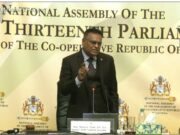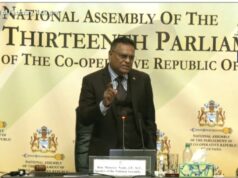Dear Editor
Western Union is again under fire. This time for what has been described as “disgraceful treatment” of Mr. Michael Carrington, Vice Chairman of the Alliance For Change (AFC). In an emotional letter published on June 6, Mr. Carrington argues that he is wrongly treated as a politically exposed person (PEP). I sympathise with his frustration. However, we must separate emotion from law.
First, let me be clear. I have written in past about some Western Union’s practices which do not mitigate risk, but give the appearance of compliance with AML guidance. Now, I will explain why, under Guyana’s Financial Intelligence Unit (FIU) guidance and the AML/CFT Act, Mr. Carrington remains a PEP—and why the public deserves clarity. In this regard, if your name becomes part of the top 65 of the list of 125 candidates that parties will field for September 1, you should read this.
1. Who is a PEP under the AML/CFT Act?
A politically exposed person is someone who is, or has been, entrusted with a prominent public function—such as a Member of Parliament (MP)—as well as their family members and close associates.
More importantly, Section 2 of Guyana’s AML/CFT Act 2009 defines a PEP as:
“…including individuals who are, or have been, entrusted domestically or by a foreign country with prominent public functions…and includes their family members and close associates.”
There is no automatic delisting after a set period under the Act. The “three-year” period Mr. Carrington refers to is derived from general international guidance, not hard Guyanese law. It should be noted that the EU, UK, and Canada do not have a short look-back period.
2. FIU Guidance is clear: party executives can be PEPs
The Financial Intelligence Unit of Guyana (FIU-GY) issued a PEP Guidance Note (2017) which extends the PEP classification to persons in senior positions within political parties, particularly where:
“…they are able to influence decisions, access public resources, or are active in political advocacy.”
Mr. Carrington is not only a former Member of Parliament, but is now the Vice Chairman of an active political party. He is a national political figure. By definition, he meets the test for being a domestic PEP. In fact, global FATF standards—on which our law is based—specifically warn against removing PEP status solely based on time out of formal public office when other risk factors may remain.
3. PEP status is not about guilt—it is about risk awareness
Being classified as a PEP is not an accusation of wrongdoing. It is not political discrimination. It is a legal safeguard to ensure enhanced monitoring of financial activity associated with public influence. This isn’t the view of Guyana’s FIU only, this is a global position.
Global financial institutions—Western Union included—are required to apply enhanced due diligence to transactions involving PEPs. The PEP designation is driven not only by national law but also by the international compliance obligations Western Union must observe. These are not decisions made by the FIU or by the Guyana Government to target an individual—they are global rules to protect the system from misuse. Western Union is particularly sensitive to this because they have been fined millions of US dollars for AML lapses.
4. Why hasn’t the flag been removed?
Mr. Carrington argues that Western Union promised to “remove” him from the system. That was unfortunate wording. What financial institutions can do is periodically reassess PEP risk, but they cannot simply delete a valid PEP record if the person continues in political influence.
As Vice Chairman of a major political party, involved in active national advocacy, Mr. Carrington may still fit the profile Western Union must monitor under their AML/CFT obligations which goes beyond Guyana’s laws.
5. The real risk: politicising compliance
Finally, I caution all sides not to politicise this issue. The PEP framework protects all Guyanese from money laundering and corruption risks—not just from current office holders, but also those with influence in political life.
Mr. Carrington’s case shows the need for better public education on what PEP really means and how the law works. But it does not show any legal violation by Western Union or collusion by the FIU.
I urge Mr. Carrington and the public to distinguish between the feelings of personal inconvenience—and the legal reality of PEP obligations.
We can all sympathise with the hardship of a delayed transaction. But we must also uphold the integrity of our AML/CFT system. A Vice Chairman of a political party remains a domestic PEP under both the spirit and letter of the law.
Respectfully,
Theon Alleyne
Compliance and Governance Consultant
Member of the Association of Certified Sanctions Specialists (ACSS)













